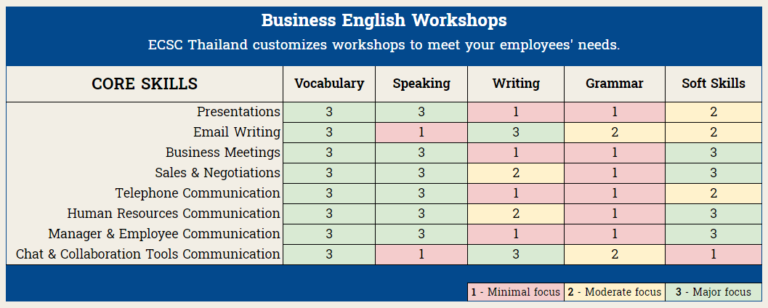One of the most important jobs for HR & Training Managers in Thailand is to choose the right English training provider. Spending training budget on bad training is a waste of time and money.
Have you ever been tasked by your boss to choose an English partner for your company? Certainly some of you have, so you probably already know how to ensure your employees get good training and the company gets good value for money.
But if some of you don’t know how, don’t worry. This article will help you.
Here are 5 questions to ask when choosing your English training provider.
● ● ●
1. “What types of Business English training do you offer?”
English training providers in Bangkok – i.e., schools and language centers like ECSC Thailand – typically offer different types of training.
The two most common types are traditional English Courses and English Workshops. Some providers also offer two other types of training such as one-on-one English Coaching for MDs and CEOs as well as in-house English Consulting services.
Each of these training types have different purposes, so it’s important to consider which one is best for your employees.
For example, Workshops provide companies with targeted language training about a specific Business English topic or skill (e.g., “English for Negotiations”), and often include some kind of soft-skills training, too.
Courses provide training for all English communication skills related to a variety of business situations. These are often better for beginner students than Workshops, which require a lot of participation and speaking from the students.
Understanding the differences between these four main types of training is crucial to making the best decision for your company’s English needs. So, the provider you are considering should clearly explain the differences to you.
2. “What skills will our employees learn from each type of training?”
After you find out the different types of training that’s available for your employees, the next question to ask the potential provider is what specific English skills would most help your employees.
This question is extremely important, and we have seen so many Human Resources personnel choose the wrong partner because they didn’t ask this question.
This question is often overlooked because some Thai companies have been led to believe that all English language training is the same. But this is not true. There is MUCH more to English training than learning grammar rules.
By asking your potential provider which skills are covered in each of the four types of training, you will be able to make an informed decision about which type will benefit your employees most. (And when we say “benefit your employees” we mean “teach them Business English that they can actually use in the workplace, in their roles, to communicate in English like a pro.”)
For example, ECSC’s Business English Workshops are a type of training that teaches five skills: Vocabulary, Speaking, Writing, Grammar, and Soft Skills.

A good English training provider will help you determine which skills your employees need to upgrade most.
● ● ●
Want to know more about the types of training ECSC Thailand provides?
● ● ●
3. “Who needs Business English training?”
Another very important question that HR, Training, and L&D Managers should ask English schools and language centers is “Who in my company really needs to improve their English?”
This can be a difficult question to answer. That’s because many companies just put every member from one of their departments into the training without considering whether they would all benefit.
The concept of ‘no one left behind’ is valid, but sometimes not every employee in a department needs to improve their English. This is especially true if their daily work tasks don’t require them to speak English or write English emails.
Instead, it would be far more effective for you to focus on employees that could do their work more effectively if they improved their English.
If you are unsure, then it’s a good idea to ask the training provider to recommend which employees would benefit the most from improving specific English skills.
We should also note that the more employees who participate in training, the less individual attention an instructor can give each trainee. This can prolong the time it takes to improve their English skills, and ultimately cost more money for your company.
You should be selective. Choose only the employees who need English training in order to perform their jobs better.
4. “How much time should be invested?”
The amount of time needed for employee English training to be effective is also an important factor. So make sure you ask potential providers how many weeks or months they recommend your company commits to training.
This question is rarely asked by HR Managers, possibly because there is a misunderstanding. That misunderstanding is that language providers can deliver a Workshop or Course, and then the employees’ English skills will improve a lot right away. But that is rarely the case.
It is important to understand that all languages, not just English, take some time to learn. So, by asking the provider about the time required for you to see measurable improvements, you can manage expectations.
Results take time, and that should be communicated to not only your boss, but the students themselves.
5. “What can I do as an HR leader to support my employees during training?”
The last question to ask potential English training providers is what you can do to stay involved.
This is another question that HR and Training Managers rarely ask, which is understandable. It is not obvious that HR or Training personnel should be involved in training that’s outside of their area of expertise.
But it is something that can be very helpful during employee English training. Monitoring the training and facilitating trainees’ progress almost always ensures better results. It shows a commitment to your people – which makes them want to participate more – and it is almost always welcomed by providers, too.
Providers should have clear plans for how you, as a client, could stay involved. This usually includes sharing ongoing feedback between you and the trainer, arranging and maintaining the training schedule and any equipment that’s needed, and addressing any questions or concerns that may come up from your employees during the training.
By working directly with the provider in this way, and advocating for your employees, they will have a better chance at succeeding.
● ● ●
Choosing the best training option for your company’s employees can be a difficult task, but ECSC Thailand is here to help you make the best decision. Just remember to ask your English training provider about the 5 key points: types, skills, needs, time, and support.
Visit our Contact Us page to inquire about English communication skills training for professionals in Thailand. Or, schedule a discovery call with our Founder, Don Gorr.
Don Gorr
I’m the Founder & Managing Director of ECSC Thailand. Our mission is to strengthen the communication capabilities of Thailand's workforce with our "English Plus" training programs.







